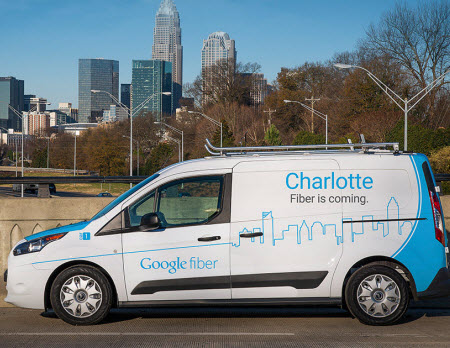Google Spreads Its Broadband Bets
The smarter way to stay on top of the multichannel video marketplace. Sign up below.
You are now subscribed
Your newsletter sign-up was successful

There might be a bit less actual “fiber” in Google’s broadband diet in the years to come.
Google Fiber, the ISP that has hitched its wagon to fiber-to-the-premises networks and Gigabit broadband services, has been flirting with wireless broadband technologies as it looks to accelerate the pace of deployments and reduce deployment costs.
Google’s courting of wireless access technologies reached the marriage stage in June, when it acquired Webpass, a company that specializes in wireless broadband delivery in markets such as San Diego, San Francisco and Oakland, Calif.; Miami, Fla.; Chicago; and Boston.
And earlier this month, Google sought permission from the Federal Communications Commission to conduct wireless broadband trials in as many as 24 U.S. locations, including New York, Chicago and Atlanta.
Google wants to conduct those experiments for about two years, and has requested to operate those trials in the 3550 to 3700 Megahertz band that has been opened up for small-cell spectrum sharing.
Google’s growing interest in wireless is also being interpreted by some as a step back from its commitment to wired networks, which are not only expensive but time-consuming to deploy from scratch.
Google Fiber is part of “Other Bets,” Alphabet’s longer-term, moonshot projects such as self-driving cars. That unit lost $709 million on revenue of $185 million in Q2.
The smarter way to stay on top of the multichannel video marketplace. Sign up below.
Alphabet, Google’s parent company, has reportedly suspended fiber projects in markets such as San Jose, Calif., and Portland, Ore., as it considers less expensive wireless alternatives.
“We’re continuing to work with city leaders to explore the possibility of bringing Google Fiber to many cities,” Google Fiber said in a statement. “This means deploying the latest technologies in alignment with our product roadmap, while understanding local considerations, which takes time.”
On the wired end, Google Fiber has launched service in parts of Nashville, Tenn.; Atlanta; Kansas City; and Provo, Utah, and also has deployments underway in Salt Lake City, Utah; San Antonio, Texas; and Charlotte and Raleigh-Durham, N.C. It has been mulling expansions in Los Angeles; Chicago; Dallas; Portland, Ore.; San Jose, San Diego and Irvine, Calif.; Phoenix, Ariz; Oklahoma City; Louisville, Ky.; and Jacksonville and Tampa, Fla.
And wireless is just one tool that Google Fiber has in its bag as a way to speed its deployment trajectory.
In some markets, such as Atlanta, Google Fiber has been plugging into existing fiber infrastructure to reach select apartment buildings. In Huntsville, Ala., Google Fiber plans to deliver services as a “tenant” on a fiber network that’s being built by the local municipality.
SIDEBAR: Piggybacking on City Networks
Wireless will be a big factor in Google Fiber’s future, but riding on the pipes of others is also part of the game plan. In Huntsville, Ala., Google Fiber will offer services as a “tenant” on a fiber network that’s being built by Huntsville Utilities.
“The key for us is that this isn’t a Google Fiber project,” Jay Stowe, CEO of Huntsville Utilities, said in a recent interview. “This is a fiber project that will help us operate our water, gas and electric system for efficiency.”
The municipality is leasing excess dark fiber to Google, which will be tasked with providing and managing the equipment to activate and light up services on those lines. There’s no revenue sharing involved, as Google Fiber will handle all customer interactions.
Huntsville Utilities will charge Google Fiber a fixed fee per address passed, a move that gives it a stable income while also reducing risk, said Stowe, who is reportedly leaving the muni this fall to become senior vice president of Distributed Energy Resources at the Tennessee Valley Authority. It is building a fiber backbone, expected to be completed by year-end, that will loop around the city and target between 100,000 to 110,000 addresses, including businesses and multiple dwelling units.
The first of six network distribution areas within the city is slated to be completed by February 2017, with the last to be done by September 2019. Theoretically, Google Fiber can start to offer service when the first network distribution area is completed early next year.
Huntsville Utilities, which has tapped The Broadband Group as a consultant, has a bidding process underway for suppliers and has budgeted about $60 million for its part of the package.
